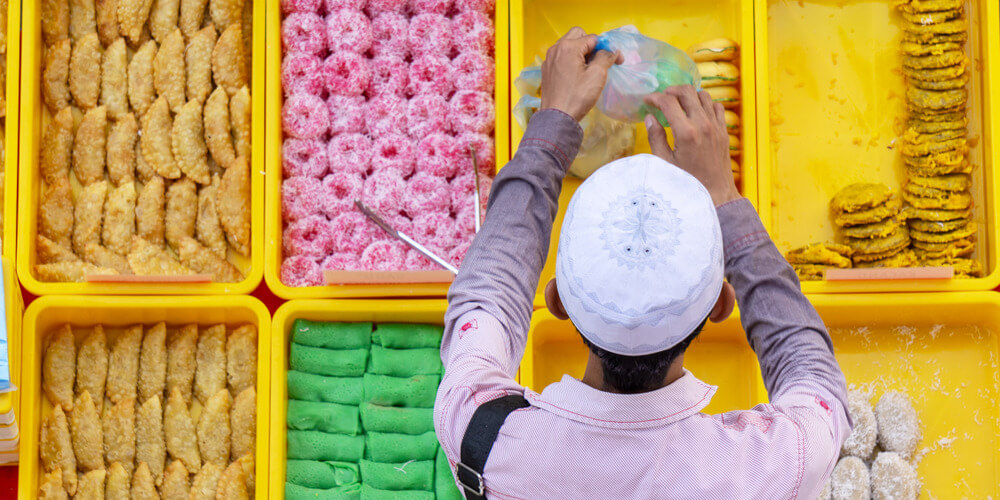Indonesia launched 13 programmes to develop a Sharia economy focused on halal products, Islamic finance, Sharia social finance and Sharia business activities expansion.
Jakarta – The Indonesian National Sharia Economy and Finance Committee or KNEKS launched 13 priority programmes for 2022 to boost the development of the Sharia economy. The programmes will focus on developing four areas: halal products, Islamic finance, Sharia social finance and Sharia business activities expansion.
Sutan Emir Hidayat, director of Islamic economy support system at KNEKS, told Salaam Gateway that four priority programmes will be in place next year to develop the halal products industry. These include standardisation of HS shipping codes for product classification, a 2022-2029 masterplan, a task force to accelerate halal certification for micro and small enterprises (MSEs), and mainstreaming research and product innovation.
For shipping data standardisation, there will be collaboration between the Directorate General of Customs and Clearance, the National Halal Agency BPJPH and National Single Window Agency of the Ministry of Finance to record any halal products on export and import documents.
For the long-term masterplan, there will be collaboration between the Ministry of Industry, Ministry of National Development Planning and Bank Indonesia (the central bank) to complete the halal product industry development long-term masterplan by the middle of 2022.
For the MSEs halal certification acceleration task force, there will be collaboration between the Indonesian Chamber of Commerce and Industry, Ministry of SOEs, Ministry of Industry, Ministry of Cooperatives and SMEs, Bank Indonesia, BPJPH and LPPOM MUI to accelerate halal certification. By the end of 2024, 80% of MSEs are targeted to be halal certified.
To mainstream research and product innovation, there will be collaboration between KNEKS and the national agency for research and innovation. “Our target is to create rapid test tools for MSEs by the end of 2024 so they can quickly halal test their product,” said Hidayat.
Sharia finance industry development
Hidayat added that to develop a Dharia finance industry, there are two priority programmes: implementing a national scale of Sharia service from Indonesia’s workers social security agency BPJS Ketenagakerjaan and developing Sharia public private partnerships (PPPs).
The first Sharia services by BPJS Ketenagakerjaan was launched in Aceh last November. The target is to launch the Sharia service nationally by the end of 2023. For Sharia PPP, the target is to reach full Sharia financing for the development of the regional government of Aceh province’s hospital, RSUD Zainoel Abidin, by the end of 2024.
The first Sharia PPP project took place in February 2021 with the East Sumatra Highway Preservation Activity Project in South Sumatra Province, although it was partially Sharia compliant.
Sharia social finance development
To develop Sharia social finance, there are two priority programmes. First, creating a platform to integrate national awqaf data and to revise awqaf law number 41/ 2004 to include cash awqaf and other market instruments that link assets with awqaf such as sukuk. The target is to collect 2 trillion rupiah ($139.5 million) accumulated national cash awqaf by the end of 2024.
“We want to promote productive awqaf management. If we look at Singapore, they linked sukuk with awqaf and the investment return from the instrument is allocated to build a shopping centre. And then the shopping centre is rented. The yield from rental is again allocated to build schools. That way awqaf management can become more productive,” Hidayat added.
The second programme is creating more Sharia cooperatives that will be managed by financial service authority OJK and the Ministry of Cooperatives and SMEs. The target is to create 500 Sharia cooperatives by the end of 2024 and all of them implement digital processes.
Sharia business activities expansion
To expand Sharia business activities, there are five priority programmes that will be in place next year, Hidayat explained. The first aims to create a national institution to supervise all programmes related to halal MSMEs development based on a digital ecosystem. The target is to provide a one-stop service to develop halal MSMEs from financing to market access as well as helping them export their product to global markets by the end of 2024.
The second programme to accelerate halal product export from MSMEs will be managed by the Ministry of Trade, the National Export Financing Agency LPEI, the Indonesian Chamber of Commerce and Industry and the central bank. The target is to export the products to 16 markets, mostly across OIC countries.
The third programme is to create a Sharia economy data centre, to be completed by the end of 2024. The data centre will include data of Sharia finance, Sharia MSMEs, halal product export and Sharia social finance like zakat, infaq, charity and awqaf. At the moment, the data is still scattered among several institutions. For instance, Islamic bank data is provided by financial service authority OJK, while Islamic payment system data is provided by the central bank.
The fourth project is to create a halal culinary zone in eight cities by the end of 2024, including Solo, Jogjakarta, Surabaya, and Malang. The Ministry of Cooperatives and SMEs, the Ministry of Tourism and Creative Economy and local governments “will together lead this initiative,” Hidayat said.
Finally the fifth project aims to create the Sharia Economy and Finance Committee’s unit at the regional level. At the moment, KNEKS has discussed with several regional governments such as West Sumatra, West Java and Gorontalo regarding the establishment of the Regional Sharia Economy and Finance Committee.
© SalaamGateway.com 2021 All Rights Reserved

